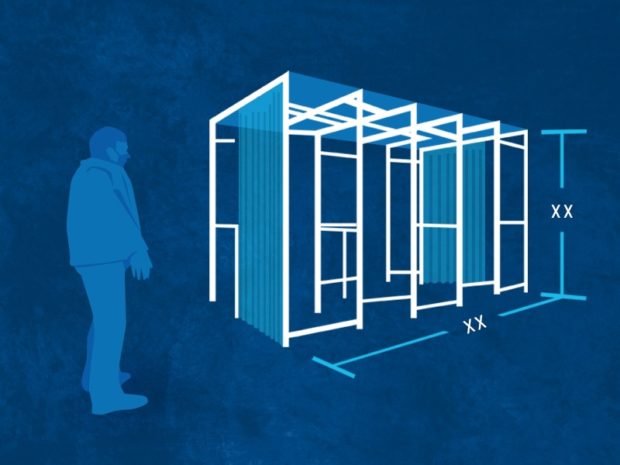COVID-19 sanitation tents: UP team won’t let quarantine lock its idea down
MANILA, Philippines—With the COVID-19 pandemic forcing people to stay at home, the spirit of bayanihan, or helping each other out, continued to shine even in quarantine confines mainly through social media.
With the aid of the internet and social media, a group of industrial designers, chemists, and engineers from the University of the Philippines is on its way to finishing the design of a sanitation tent that’s not only timely but could play a major role in stopping the spread of the disease.
They are doing it even as they heed restrictions in movement of people outside their homes which goes to show there’s no quarantining ideas and the desire to help.
The idea started with industrial engineer August Patacsil when he realized that the elderly were more vulnerable to the virus that causes COVID-19 as the number of cases in the country zoomed past 200.
“As an industrial designer, I felt the urge to form a team to address the pressing concern,” said Patacsil.
Article continues after this advertisement“There are people out there who have no clue as to what the lockdown is for,” Patacsil said in an article that his team shared with INQUIRER.net
Article continues after this advertisement“After the lockdown people did the opposite. By then I knew something needs to be done, and it needed the right people,” he added.
But before Patacsil could set out with his plan, he knew there was so much still to be known about the virus and asked a doctor in the military to help with information.
Team straight out of the internet
One of the more prominent UP-based groups on social media is the “Overheard in UP”. It is here where UP alumni and students share stories about their experiences in UP and talk about pressing social issues.
It also became a venue for Patacsil to call the attention of chemistry scientists who can be of help in the project.
“After informing the people that I am working on a rapid prototype for a decontamination tent, people responded right away,” Patacsil said.
Through group chats, Facebook groups, network, Patacsil said “a team was formed in less than an hour.”
Patacsil also called on industrial designers to give a hand.
“I was overwhelmed ,” Patacsil said.
“I felt the need to tap industrial designers that I have worked with that have the skillset the project needs,” he said.
He said he called on his friends at the College of Fine Arts “and as expected, they heeded the call to serve the people.”
What are the tents for
Messages of support came in, as more and more people expressed interest in helping in the project, said Patacsil.
But what is the project really all about?
The objective was clear—create decontamination implements and devices that can be built by the average person.
It has to be low-cost and made of what Patacsil and his team said were upcyclable materials available anywhere. The design should also be executable by local governments and private entities. It should also be effective in fighting the spread of COVID-19.
Patacsil said he consulted with a “key person, an industrial designer” who is “now coordinating the whole design process.”
He said he told the industrial designer “I foresee this project going full scale so there is a need for a project management professional to manage the whole project.”
The social media group Overheard in UP “was the right place to pool a volunteer,” Patacsil said.
A faculty member of the University of the Philippines Los Banos came in and “the project gained more confidence knowing that it’s supported by faculty members,” he said.
In less than 24 hours from posting the message seeking volunteers to the UP social media group, the team was completed with a single underlying objective—serve the people.
The initial team was composed of a manager, designers, chemists, and engineers. But later, the network grew with the addition of virologists, microbiologists, visual artists, and mathematicians.
“Almost without supervision, leaders identified themselves in respective teams, directions were clear to everyone, departments collaborating with what is needed,” Patacsil said.
“It’s still growing as we speak, and I think the genius behind this is that the people know where they can contribute best,” he added.
What now?
As of this time, the team is still finalizing the design of the sanitation tents and a prototype will be made soon.
Once finished, the group intends to offer the design free-of-charge, to different local government units (LGUs) and institutions who wish to produce them.
It will also produce build instructions to help LGUs and institutions assemble the tents.
The sanitation tents can be used in public spaces such as hospital entrances, MRT and LRT stations, grocery stores, public markets, among others.
“We are doing our best to serve the people, free of charge,” Patacsil said.
“This is to help our health workers who are dealing with the pandemic and we’re doing our best to contribute something,” he added.
“It’s moving as planned,” he said even as team members work from home because of the expanded community quarantine that now covers the entire island of Luzon.
The team pleaded for help from the public to update its database with details about different local governments in the country.
Those who wish to help the team with the information it needed can visit tinyuri.com/covidsanitationtent to add local government contact details.
Edited by TSB
For more news about the novel coronavirus click here.
What you need to know about Coronavirus.
For more information on COVID-19, call the DOH Hotline: (02) 86517800 local 1149/1150.
The Inquirer Foundation supports our healthcare frontliners and is still accepting cash donations to be deposited at Banco de Oro (BDO) current account #007960018860 or donate through PayMaya using this link.
